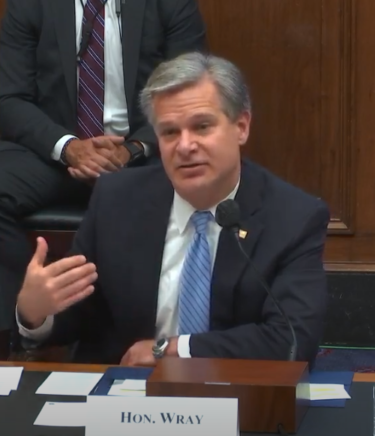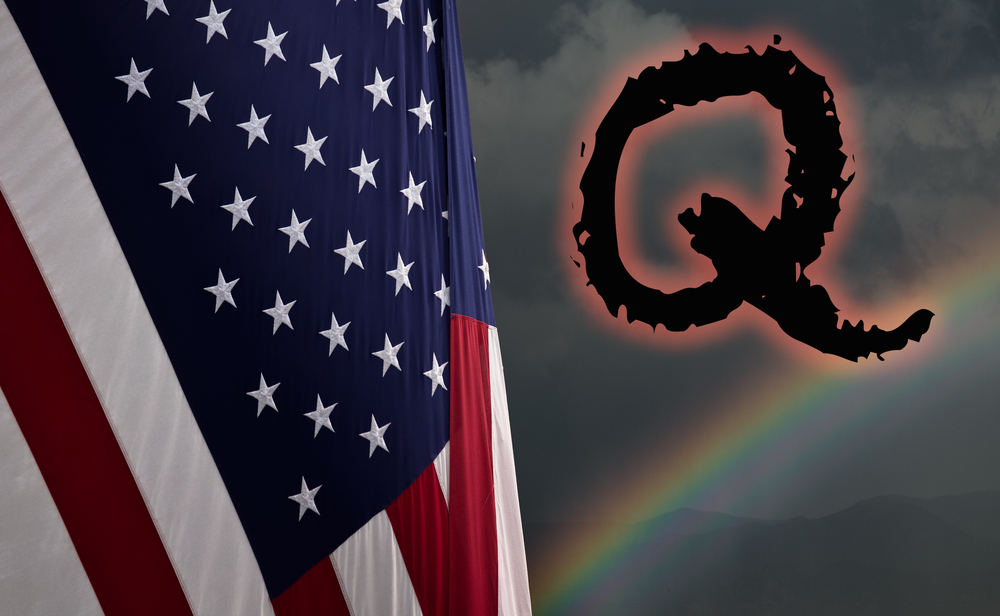FBI Director Christopher Wray tells Congress that the FBI views QAnon as being less of an organization and more of a “complex set of conspiracy theories,” but that the FBI “doesn’t investigate the ideology or conspiracy theory itself.”

FBI Director Christopher Wray
“We view QAnon as essentially less of an organization and more of a sort of complex set of conspiracy theories” — FBI Director Christopher Wray
During a hearing before the House Committee on Homeland Security on Thursday, FBI Director Wray was asked how the FBI assessed QAnon-related activities.
“We view QAnon as essentially less of an organization and more of a sort of complex set of conspiracy theories, and certainly we have had properly predicated cases involving violence where people have been motivated by some of those conspiracy theories,” Wray testified.
“We don’t investigate the ideology or the conspiracy theory itself. I don’t think we’ve seen lethal attacks involving that kind of motivation,” he added.
When asked what it would take for the FBI to open an investigation into “QAnon activity,” Wray responded, “No matter what ideology or belief it is, of domestic violent extremism, we look at three things.”
Those three things include:
- Violence or a threat of violence
- A federal crime
- The motivation that fuels 1 and 2
“We have to have those three things to open an investigation,” Wray added.
While Wray said that the FBI doesn’t investigate ideologies or conspiracy theories, it does look at the motivation after the violence (or threat of violence) and federal crime has occurred.
“We assess that the greatest threat to the homeland — to us here domestically — is not one organization, certainly not one ideology, but rather lone actors, largely self-radicalized online, who pursue soft targets using readily accessible weapons” — FBI Director Wray
The FBI director said that most extremist violence in the United States can be attributed to “lone actors” who sometimes identify as supporters of certain ideologies — such as those of Antifa and QAnon — but that the FBI doesn’t attribute violence to those ideological groups as a whole.
When asked where the biggest domestic threats were coming from (i.e. left wing vs right wing extremists), Director Wray responded:
“We assess that the greatest threat to the homeland — to us here domestically — is not one organization, certainly not one ideology, but rather lone actors, largely self-radicalized online, who pursue soft targets using readily accessible weapons.
“And those include both domestic violent extremists of a variety of sorts, as well as homegrown violent extremists who are motivated by foreign jihadist-type sources.
“Those two categories as a whole provide the greatest challenge and threat to us here at home.”
“Our domestic violent extremists include everything from racially motivated violent extremists […] all the way to anti-government, anti-authority violent extremists — and that includes people ranging from anarchist violent extremists, people who subscribe to Antifa or other ideologies, as well as militia types” — FBI Director Wray
Speaking on whether Antifa was a threat to the homeland, Wray said, “We don’t really think of threats in terms of left and right at the FBI. We’re focused on the violence and not the ideology.
“Our domestic violent extremists include everything from racially motivated violent extremists […] all the way to anti-government, anti-authority violent extremists — and that includes people ranging from anarchist violent extremists, people who subscribe to Antifa or other ideologies, as well as militia types,” he added.
Q Posts vs Q Followers’ Interpretations
There’s a lot of mystery surrounding QAnon, and I’m not here to defend nor attack the Q boards, but rather attempt to provide some balance to mainstream narratives.
I see major differences from what Q actually posts and how followers interpret those posts without actually knowing if they are correct in their interpretations.
For those who haven’t heard of Q, the media portrays it as a right-wing conspiracy theory, and the media usually runs with stories that come from the beliefs or actions of people who follow Q instead of what Q actually posts — the latter of which can be quite cryptic.
Others believe that Q is a military intelligence operation that now uses 8Kun as a back channel to relay information on what is going on behind the scenes to the public.
The group known as Q has the luxury of plausible deniability in that it is anonymous and the information it posts is sometimes heavily coded while blending allegedly real intelligence with disinformation, but I’ve never seen a call to violence from posts coming from Q.
I think the media most often doesn’t distinguish between what Q actually posts and what Q followers think those posts mean — the media tends to report on what Q followers interpret as their own truths rather than what Q actually posts.
At the same time, violence has been carried out in the name of Q, and I am against anyone unlawfully committing violence against their fellow citizens, no matter which groups they support.
If you want to see what Q actually posts, you can find all the posts on qanon.pub to see for yourself without all the noise of what other people like me say about them, with the knowledge that Q says “disinformation is necessary.”
All information, no matter what the source, should be viewed with a critical eye, including my own opinions.
Think for yourself? Facebook removes QAnon-related content as ‘coordinated inauthentic behavior’
‘If you’re an American adult, it’s likely that China has stolen your personal data’: FBI director












